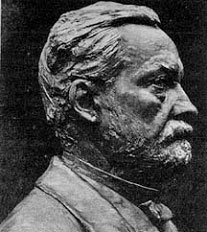|
Louis Pasteur (1822-1895)

Born on December 27th, 1822 in France, Pasteur received
a degree of bachelor of letters from the College Royale de Besancon.
As part of his studies he investigated the crystallographic, chemical
and optical properties of tartaric acid. His work laid the foundations
for later study of the geometry of chemical bonds. Eventually, Pasteur's
research in the optical activity of organic substances would be used
as a tool for identifying molecular structure. He was quickly appointed
as an assistant professor of chemistry.
By 1854, Pasteur's work had gotten him appointed the dean of the school
of science at the University of Lisle. He discovered that fermentation,
putrefaction, infection and souring are all caused by living microbes,
better known as common day germs.
In 1857 Pasteur published his first paper on the formation of lactic
acid and its function in souring milk. With further research, he developed
the technique of pasteurization
In the years to come, most of Pasteur's efforts went towards convincing
other scientists that germs do not originate spontaneously in substances,
but enter from the outside. His work in understanding the functioning
of bacteria led him to find a cure for a mysterious disease that was
attacking silk worms and he discovered the concept of immunization in
his work with curing anthrax.
He later ventured to use the same immunization process on humans to
prevent rabies that he used on cattle to prevent anthrax and was tremendously
successful. Pasteur was a scientific genius whose discoveries have most
likely extended all of our lives through disease prevention.
His discoveries have saved countless lives and created new technologies
from which the world can profit. Among his discoveries are the pasteurization
process, and ways of preventing silk worm diseases, anthrax, chicken
cholera and rabies.
He died on September 28th, 1895.
|